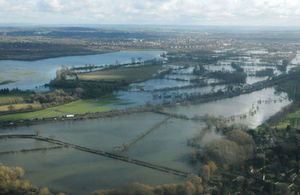Flood scheme boost with £36m of funding
Communities across England will benefit from enhanced flood protection

Communities across England will benefit from better flood protection
From Hull to Bath and Wolverhampton to the Wirral, communities up and down England are set to benefit from a government cash boost that will protect thousands of homes from flooding, enhance the environment and bolster economic growth and tourism.
Environment Minister Thérèse Coffey has today (Tuesday, 27 March) announced that 25 new schemes will receive a share of £36 million announced in the Autumn Statement to improve flood protection.
One of the biggest beneficiaries is Hull, where £12 million will improve the defences along the River Hull to protect homes, businesses, infrastructure and areas of cultural importance within the city. The funding will support the second phase of the project which started in 2016 and has so far seen 39 sections of defence improved over a 7.5km stretch of river.
The main pier at Seahouses, Berwick-upon-Tweed, protecting 140 properties and the town’s picturesque harbour, will be regenerated thanks to an extra £2.9 million.
Rivers will be restored and habitat improved in Gloucester, where £1.2 million will go to projects to protect 370 properties along the Sud Brook and River Twyer.
In Derby, more than £300,000 will help create new wetlands and flood reservoirs to not only protect 110 homes from flooding but also enhance biodiversity in residential areas.
Environment Minister Thérèse Coffey said:
This funding will benefit projects across the country from Hull to Gloucester, from Wolverhampton to the Wirral, that need an extra boost for flood defences to help our communities continue to prosper and grow in the future.
Not only will this investment make places more resilient against flooding, but it will help the local economy, enhance the natural environment and protect important areas of culture - whether it is the homes, businesses and cultural sites in Hull to the pier in Seahouses or the natural environment in Gloucester.
The government has worked with the Environment Agency to prioritise the areas that would get the most benefit – the schemes will not only protect an additional 3,000 properties from flooding but will contribute to wider benefits for the community.
Sir James Bevan, Chief Executive of the Environment Agency, said:
In the face of challenges like a changing climate, rising sea levels and more severe weather, the Environment Agency is working hard to protect people, homes and businesses from flooding.
As with every project we undertake, we’re also striving to improve our environment and this additional funding will not only help us build flood defences, but restore vital habitat and bring nature back to some of our urban communities.
The additional £36 million funding was initially set aside for new projects in the Autumn Budget. The £33.8 million funding allocated today will go towards 25 flood schemes over the next three years, in addition to the £2.2 million given to 13 projects in Cumbria and Devon at the end of last year.
In the Autumn Budget, the Chancellor announced £76 million to be spent on flood and coastal defences – £36 million for new schemes and £40 million to boost local regeneration in deprived communities at high flood risk.
This brings the total investment in flood defence to £2.6 billion by 2021, when more than 1,500 flood defences will have been built to protect 300,000 homes up and down the country.
Over the past two years, the Environment Agency has completed more than 350 new flood schemes to protect 100,000 homes. In addition to building hard defences, it has improved its response by investing in new technology and equipment like temporary flood barriers, pumps and 6,500 trained staff across the country.
The Environment Agency’s free flood warning system also reaches more than 1.2 million people to give them vital warning when flooding is expected. You can check your risk and sign up to receive warnings on GOV.UK here or by calling 0345 988 1188.